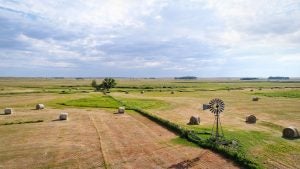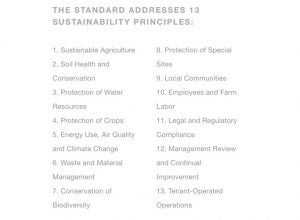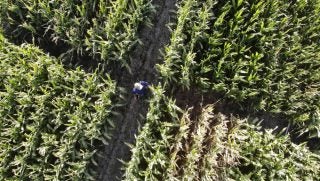When media articles came out showing that Bill Gates is the No. 1 private owner of farmland in America, it became a hotly debated topic on social media and in other comment sections. Enter the conspiracy theorists who believe he’s a villain who’s only out to control the world and it’s food supply.
Because I am an outspoken advocate for farmers, many people asked for my opinion on the topic. My thoughts? Who cares — it’s probably a good thing.
Now before you jump all over me for my nonchalant statement here, hear me out. Billionaires who buy land are nothing new. Nowadays it’s just an especially hot topic because, well, media. But historically, billionaires such as Jeff Bezos and Ted Turner are known to own a lot of land. But let’s also look specifically at Warren Buffett and his son, Howard.
Warren Buffett, whose net worth is about $85 billion, has been saying for years that buying farmland just outside of his hometown of Omaha, Nebraska, has been one of his original, oldest, and best long-term investments to date. And if you look at tried-and-true investment advice, pretty much anyone who knows about portfolios will tell you that purchasing land will undoubtedly be a good idea in the long run. The Earth is not creating any new land, but with the population explosion we’ve seen in recent generations, land values have continued to rise exponentially.

So what else about the Buffetts are tied to farming? His middle son, Howard, is actually a farmer and author of the book “40 Chances: Finding Hope in a Hungry World.” It’s based on the idea that farmers will generally have 40 times throughout their career to keep the world fed and improve their harvests. 40! When you think about it, that’s really not that much. And that’s what is so powerful about the book. Global food security is a huge issue, and to think that 40 chances might be all you got, well, it makes you think.
This is the similarity to both the Buffett and the Gates families. Having money and power is one thing, but as philanthropists, they have the power to ignite movements and implement real change, particularly in the developing world.
The Bill and Melinda Gates Foundation is, in fact, an outspoken advocate of agricultural sustainability through genetic engineering, funding groups like the Cornell Alliance for Science, to help improve science communication and raise awareness about — and solutions to — global hunger. Being a part of the development of drought- and flood-resistant crops, while offering scientific advancements to livestock and crop harvest improvements for humanity, is clearly a passion of the Gateses; and while we have a ways to go, substantial improvements are being made every day. In fact, they’ve donated hundreds of millions of dollars in grants to African and Asian farmers specifically for sustainable agriculture. Of course, the topic is complex and full of gray areas, but the efforts and research are there, and you can read more about it here.
But what about Gates’ land in the U.S.? What will it be used for? What’s it like having him as a landlord?Will any of this be used for research to continue to improve upon global food security?
Gates’ personal investment vehicle is called Cascade Investments, with one of its subsidiaries named Cottonwood Ag Management, which is partnered with Leading Harvest. “Sustainable“ could be a marketing buzzword sure, but Gates’ push into futuristic “double or triple the yield” goals could be a promising sign for the planet without clearing additional acreage. Fighting the role of climate change is certainly a continuing trend as investors seek more alternative assets.
Leading Harvest is also partnered with FarmTogether, an investment platform that offers anyone direct access to U.S. farmland ownership. Fighting the role of climate change is certainly a continuing trend as investors seek more alternative assets:

While the challenge of feeding a growing global population with limited arable land seems daunting, I guess I’ve always been a bit of an optimist and personally put a good amount of faith, appreciation and trust into the sciences. Some people might look at this list and scratch their head with a “huh? How will we do that?” But I guess that’s what it’s all about. Keeping an open mind while taking a leap of faith and appreciating a new approach to long-term positive standards. Resilient, intelligent, forward thinking farmers? Pssssh. You got this.
In closing, I’ve always appreciated this quote from Dr. Mark Lyons: “The biggest threat to agriculture is tradition.”
In my opinion summary, it seems Gates has done incredible work in sciences and philanthropy for humanity and is doing what other intelligent billionaire investor would do: make more money while continuing his track record to use much of it for good. The organizations and ideologies behind it all in theory sound promising, and we shall see how it all pans out.
Michelle Miller, the Farm Babe, is a farmer, public speaker and writer who has worked for years with row crops, beef cattle, and sheep. She believes education is key in bridging the gap between farmers and consumers.



